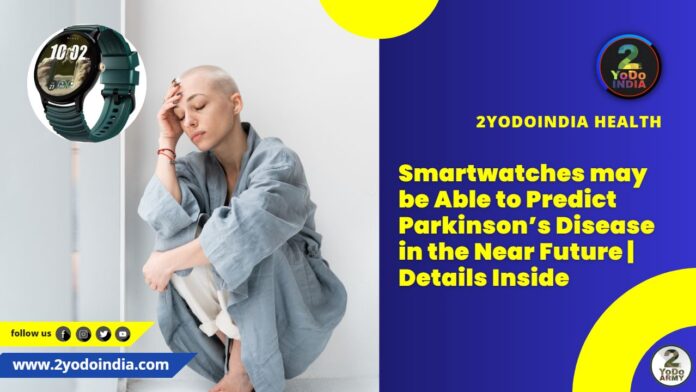As per recent reports, Smartwatches could revolutionize the early detection of Parkinson’s disease. This was based on a groundbreaking study conduct by the UK Dementia Research Institute team at Cardiff University.
About Research
By leveraging artificial intelligence and analyzing data from over 100,000 smartwatch wearers, the researchers were able to predict the development of Parkinson’s up to 7 years before symptoms appear.
The key to their prediction lay in tracking the speed of movement of the participants over a single week between 2013 and 2016.
The potential of this discovery as a screening tool is huge, to say the least, but a lot of further studies are require to validate its accuracy by comparing the findings with data from around the world.
Publish in the journal Nature Medicine, the study highlights the need for extensive research to confirm these findings.
Parkinson’s disease is characterize by the progressive degeneration of brain cells over an extended period.
The classic symptoms include involuntary shaking or tremors, slow movement, and stiff muscles.
Unfortunately, by the time a diagnosis is made, irreversible damage has often already happen.
About 30% of the UK population has adopt smartwatches, and that’s because it offers a promising avenue for early-stage Parkinson’s detection.
Study leader Dr. Cynthia Sandor believes that the ability to predict events up to 7 years in advance based on a week’s worth of data could lead to the development of a valuable screening tool.
This tool would not only facilitate early detection but also aid in clinical trial recruitment and allow patients to access treatments at an earlier stage when they become available.
The study based on data from the UK Biobank, an extensive health database encompassing over half a million individuals.
Dr. Kathryn Peall, a researcher involve in the study, express confidence in the accuracy of the model, stating that it could differentiate Parkinson’s from other conditions that affect movement, such as old age or frailty.
The ethical implications of informing individuals about their Parkinson’s diagnosis years before symptoms set in is a whole different dilemma.
So, as of now, it will remain a matter of personal choice.
What is Parkinson’s Disease?
Parkinson’s disease (PD) is a chronic and progressive neurodegenerative disorder that primarily affects movement control.
Parkinson’s Disease is name after Dr. James Parkinson, who first describe the condition in 1817.
As Parkinson’s disease affects approximately 1% to 2% of people over the age of 65, and its incidence increases with age.
Causes of Parkinson’s Disease
The exact cause of Parkinson’s disease is unknown, but it is believe to result from a combination of genetic and environmental factors.
Some cases of Parkinson’s Disease are consider to be genetic, cause by mutations in specific genes.
So, the majority of cases are consider sporadic, with no known genetic cause.
Symptoms of Parkinson’s Disease
Parkinson’s disease is characterize by a variety of motor and non-motor symptoms, which may vary in severity and progression from person to person.
Motor Symptoms
- Tremors : Typically a resting tremor, which often begins in one hand or arm and can progress to involve other limbs or the jaw.
- Bradykinesia : Slowness of movement, making simple tasks like buttoning a shirt or walking difficult and time-consuming.
- Rigidity : Stiffness and resistance to movement in the limbs and trunk.
- Postural instability : Impair balance and coordination, leading to difficulties with posture and an increase risk of falls.
Non-motor Symptoms
- Cognitive changes : Many individuals with Parkinson’s may experience mild cognitive impairment or dementia.
- Depression and anxiety : These are common psychological symptoms associate with Parkinson’s Disease.
- Sleep disturbances : Including insomnia, REM sleep behavior disorder, and excessive daytime sleepiness.
- Autonomic dysfunction : Symptoms can include constipation, urinary problems, and low blood pressure.
- Speech and swallowing difficulties : These can develop over time and affect communication and nutrition.
Diagnosis of Parkinson’s Disease
Diagnosing Parkinson’s disease can be challenging, as there is no definitive test for the condition.
Physicians rely on a combination of medical history, physical examination, and the presence of characteristic motor symptoms.
Imaging techniques such as MRI or DaTscan may be use to rule out other causes of symptoms and support the diagnosis.
Treatment of Parkinson’s Disease
As there is currently no cure for Parkinson’s disease, many treatment options are available to manage the symptoms and improve the quality of life for individuals with Parkinson’s Disease.
These include:
- Medications : The most common medications prescribe for Parkinson’s disease are levodopa, which increases dopamine levels in the brain, dopamine agonists, and other drugs that help manage motor symptoms.
- Deep brain stimulation (DBS) : This surgical procedure involves implanting electrodes into specific areas of the brain to help control movement and alleviate symptoms.
- Physical therapy and exercise : These interventions can help improve mobility, balance, and overall fitness.
- Speech therapy : Specialize therapy can assist with speech and swallowing difficulties that may arise in Parkinson’s disease.
- Supportive therapies : Occupational therapy, psychotherapy, and support groups can provide emotional support and help individuals cope with the challenges of living with Parkinson’s Disease.
Research about Parkinson’s Disease
Scientists continue to study Parkinson’s disease to better understand its causes and develop new treatments.
Advances in genetics, stem cell research, and neuroprotective strategies offer hope for future breakthroughs in the treatment and prevention of PD.
It’s important for individuals with Parkinson’s disease to work closely with healthcare professionals to develop a personalize treatment plan and to stay inform about new research and therapies that may become available.
So, the potential impact of above research lies in the fact that it will greatly speed up the development of therapies capable of slowing disease progression.





